The 48 Laws of Power Summary & Quotes. it is a non-fiction book by American author Robert Greene (1998). The book is a New York Times bestseller, selling over 1.2 million copies in the United States; it is popular with prison inmates and celebrities.
Greene initially formulated some of the ideas in The 48 Laws of Power while working as a writer in Hollywood and concluding that today's power elite shared similar traits with powerful figures throughout history. In 1995, Greene worked as a writer at Fabrica, an art and media school, and met a book packager named Joost Elffers. Greene pitched a book about power to Elffers and six months later, Elffers requested that Greene write a treatment.
Although Greene was quite unhappy in his job, he was comfortable and saw the time needed to write a proper book proposal as too risky. However, at the time Greene was rereading his favorite biography about Julius Caesar and took inspiration from Caesar's decision to cross the Rubicon River and fight Pompey, thus inciting the Caesar's civil war. Greene wrote the treatment, which would later become The 48 Laws of Power. He would note this as the turning point of his life.
 |
| The 48 Laws of Power Summary |
The 48 Laws of Power Summary
The 48 Laws of Power maintains that learning how to influence others and have power over them is essential to a person’s success. The 48 laws are each self-contained, featuring examples of historical figures who have transgressed and abided by that particular law. While transgressors have seen their power depleted, observers have enjoyed unparalleled influence over others and events.
A prominent trend amongst the laws is mastering the balance of standing out enough to attract attention, whilst seeming discreet and amenable enough to not be viewed as a threat and thereby eradicated by the more powerful. While Greene’s injunctions to be subtle and bold, congenial and ruthless often contradict each other, the text as a whole shows that power wears “many masks” and keeps “a bag full of deceptive tricks”.
Thus, a reader’s ability to read the situation they find themselves in is paramount, as is their ability to plan and act accordingly. Throughout, the laws emphasize the importance of dissimulation over candor, as Greene views honesty as a “blunt instrument, which bloodies more than it cuts” when it offends others and gives away your character, thereby making you easier to defeat.
Greene ends his book with the paradox that no amount of received wisdom will help you in the present challenge you find yourself in. Instead of aiming to apply the laws of the book or the methods that have led to past triumphs, the reader would be better off immersing themselves in the present moment and tailoring their response to the situation at hand.
You may also like to read: The Power of Habit Book Summary
The 48 Laws of Power Quotes
- “When you show yourself to the world and display your talents, you naturally stir all kinds of resentment, envy, and other manifestations of insecurity... you cannot spend your life worrying about the petty feelings of others”
- “Keep your friends for friendship, but work with the skilled and competent”
- “Do not leave your reputation to chance or gossip; it is your life's artwork, and you must craft it, hone it, and display it with the care of an artist.”
- “Many a serious thinker has been produced in prisons, where we have nothing to do but think.”
- “...But the human tongue is a beast that few can master. It strains constantly to break out of its cage, and if it is not tamed, it will tun wild and cause you grief.”
- “Never waste valuable time, or mental peace of mind, on the affairs of others—that is too high a price to pay.”
- “Lord, protect me from my friends; I can take care of my enemies.”
- “There is nothing more intoxicating than victory, and nothing more dangerous.
- “Strike the shepherd and the sheep will scatter”
- “person who cannot control his words shows that he cannot control himself, and is unworthy of respect.”
- “For the future, the motto is, "No days unalert.”
- “Be Royal in your Own Fashion: Act like a King to be treated”
- “To succeed in the game of power, you have to master your emotions. But even if you succeed in gaining such self-control, you can never control the temperamental dispositions of those around you. And this presents a great danger.”
- “When you meet a swordsman, draw your sword: Do not recite poetry to one who is not a poet.”
- “do I not destroy my enemies when I make them my friends?”
- “Never be distracted by people’s glamorous portraits of themselves and their lives; search and dig for what really imprisons them.”
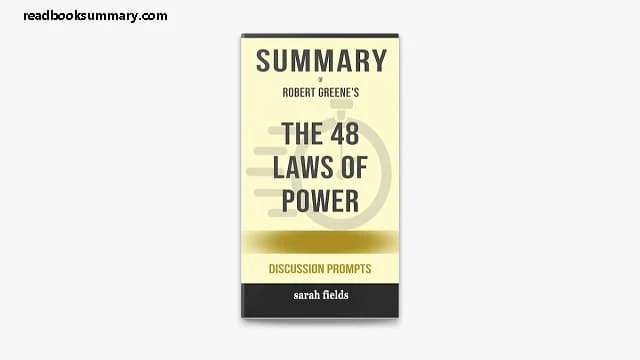 |
| list of 48 laws of power |
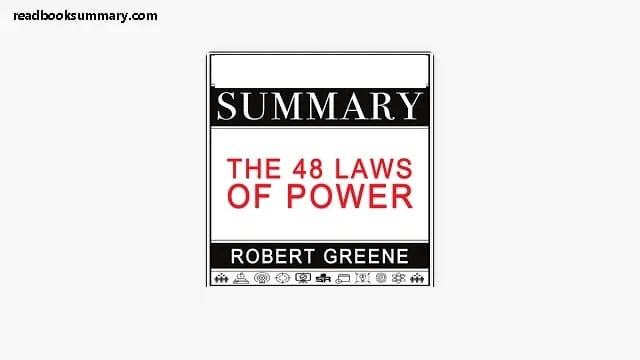 |
| synopsis of the 48 laws of power |
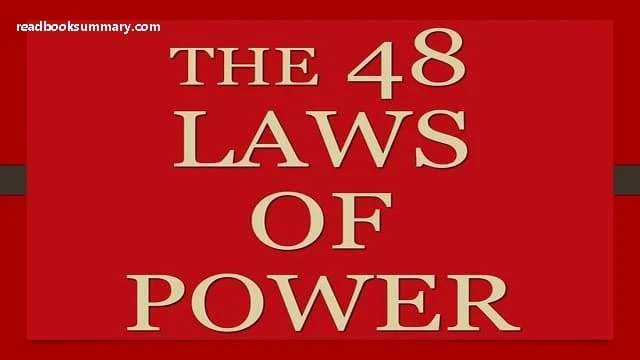 |
| 48 laws of power book summary |
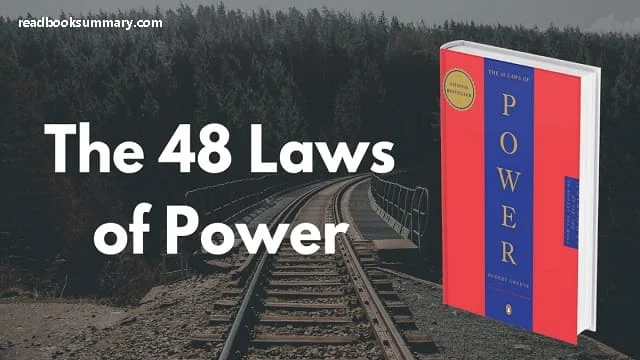 |
| laws of power summary |
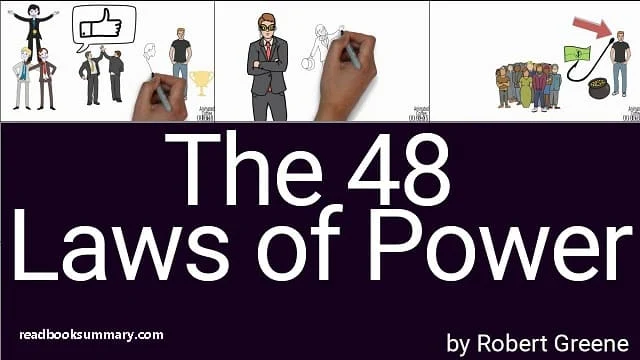 |
| the 48 laws of power synopsis |
Questions and Answers about The 48 Laws of Power Book
What are the 48 laws of power in order?
- 1. Never Outshine the Master
- 2. Never Put Too Much Trust in Friends, Learn How to Use Enemies
- 3. Conceal Your Intentions
- 4. Always Say Less Than Necessary
- 5. So Much Depends on Reputation – Guard It With Your Life
- 6. Court Attention at All Costs
- 7. Get Others to Do the Work for You, but Always Take the Credit
- 8. Make Other People Come to You – Use Bait if Necessary
- 9. Win Through Your Actions, Never Through Argument
- 10. Infection: Avoid the Unhappy and the Unlucky
- 11. Learn to Keep People Dependent on You
- 12. Use Selective Honesty and Generosity to Disarm Your Victim
- 13. When Asking for Help, Appeal to the Self-interests of Others, Never to Their Mercy or Gratitude
- 14. Pose as a Friend, Work as a Spy
- 15. Crush Your Enemy Totally
- 16. Use Absence to Increase Respect and Honor
- 17. Keep Others in Suspended Terror: Cultivate an Air of Unpredictability
- 18. Do Not Build Fortresses to Protect Yourself – Isolation is Dangerous
- 19. Know Who You’re Dealing With – Don’t Offend the Wrong Person
- 20. Don’t Commit to Anyone
- 21. Play a Sucker to Catch a Sucker – Appear Dumber Than Your Mark
- 22. Use the Surrender Tactic: Transform Weakness Into Power
- 23. Concentrate Your Forces
- 24. Play the Perfect Courtier
- 25. Recreate Yourself
- 26. Keep Your Hands Clean
- 27. Create a Cult-like Following by Playing on People’s Need to Believe
- 28. Enter Action With Boldness
- 29. Plan All the Way to the End
- 30. Make Your Accomplishments Seem Effortless
- 31. Control the Options: Get Others to Play With the Cards You Deal
- 32. Play Into People’s Fantasies
- 33. Discover Each Man’s Thumbscrew
- 34. Be Royal in Your Own Fashion: Act Like a King to Be Treated Like One
- 35. Master the Art of Timing
- 36. Disdain Things You Cannot Have: Ignoring Them is the Best Revenge
- 37. Create Compelling Spectacles
- 38. Think as You Like, but Behave Like Others
- 39. Stir Up Waters to Catch Fish
- 40. Despise the Free Lunch
- 41. Avoid Stepping Into a Great Man’s Shoes
- 42. Strike the Shepherd, and the Sheep Will Scatter
- 43. Work on the Hearts and Minds of Others
- 44. Disarm and Infuriate With the Mirror Effect
- 45. Preach the Need for Change, but Never Reform Too Much at Once
- 46. Never Appear Too Perfect
- 47. Don’t Go Past the Mark You Aimed For: In Victory, Learn When to Stop
- 48. Assume Formlessness.
Is 48 Laws of Power worth reading? The 48 Laws of Power is a candid and controversial examination of power and its many dynamics. If you want to understand people and ascend in the world, this book is a good starting place. You'll learn about the nature of power, how to acquire it, and the dark ways in which people operate in the world.
Why is the 48 Laws of Power so popular? For good reason: Much like Machiavelli's treatise, 48 Laws of Power was designed, by and large, to help men navigate their way to the top of the corporate ladder; and much like The Prince, it offers a set of vague rules, strategies and manipulation techniques to attain it.
Which 48 Laws of Power ignore people? According to Law 36 of the 48 Laws of Power, When faced with an irritating, but minor offense, sometimes the best course is to ignore it. Not responding can be a demonstration of power — a message that it's not worth your interest.
How long to read 48 laws? The average reader will spend 7 hours and 32 minutes reading this book at 250 WPM (words per minute).
What is the 16 law of power? According to Law 16 of the 48 Laws of Power, with a strong presence, you attract attention and overshadow everyone else. But if you overdo it and become ubiquitous, people will stop paying attention to you and you'll lose respect and power. This is where absence comes in.
What 48 Laws of Power make it look easy? According to Law 30 of the 48 Laws of Power, if you make your accomplishments seem effortless, you can generate awe in others and seem powerful. People admire those who perform seemingly impossible feats, especially when they make it look easy.
What does the 48 Laws of Power say about enemies? Always be alert to potential attacks and thwart them before they happen. Meanwhile, learn to destroy your enemies by opening holes in their own reputations. Then stand aside and let public opinion hang them." Source: Robert Greene's "The 48 Laws Of Power."
Who are the people mentioned in 48 Laws of Power? Synopsis of The 48 Laws of Power are a distillation of 3,000 years of the history of power, drawing on the lives of strategists and historical figures like Niccolò Machiavelli, Sun Tzu, Carl von Clausewitz, Queen Elizabeth I, Henry Kissinger, P.T. Barnum, and Baltasar Gracián.
What is the best revenge in the 48 laws? 36. Disdain Things You Cannot Have: Ignoring Them is the Best Revenge. The less interest you take in things that irritate you, the more superior you seem. By acknowledging your enemy, you give their existence credibility and, therefore, power.
